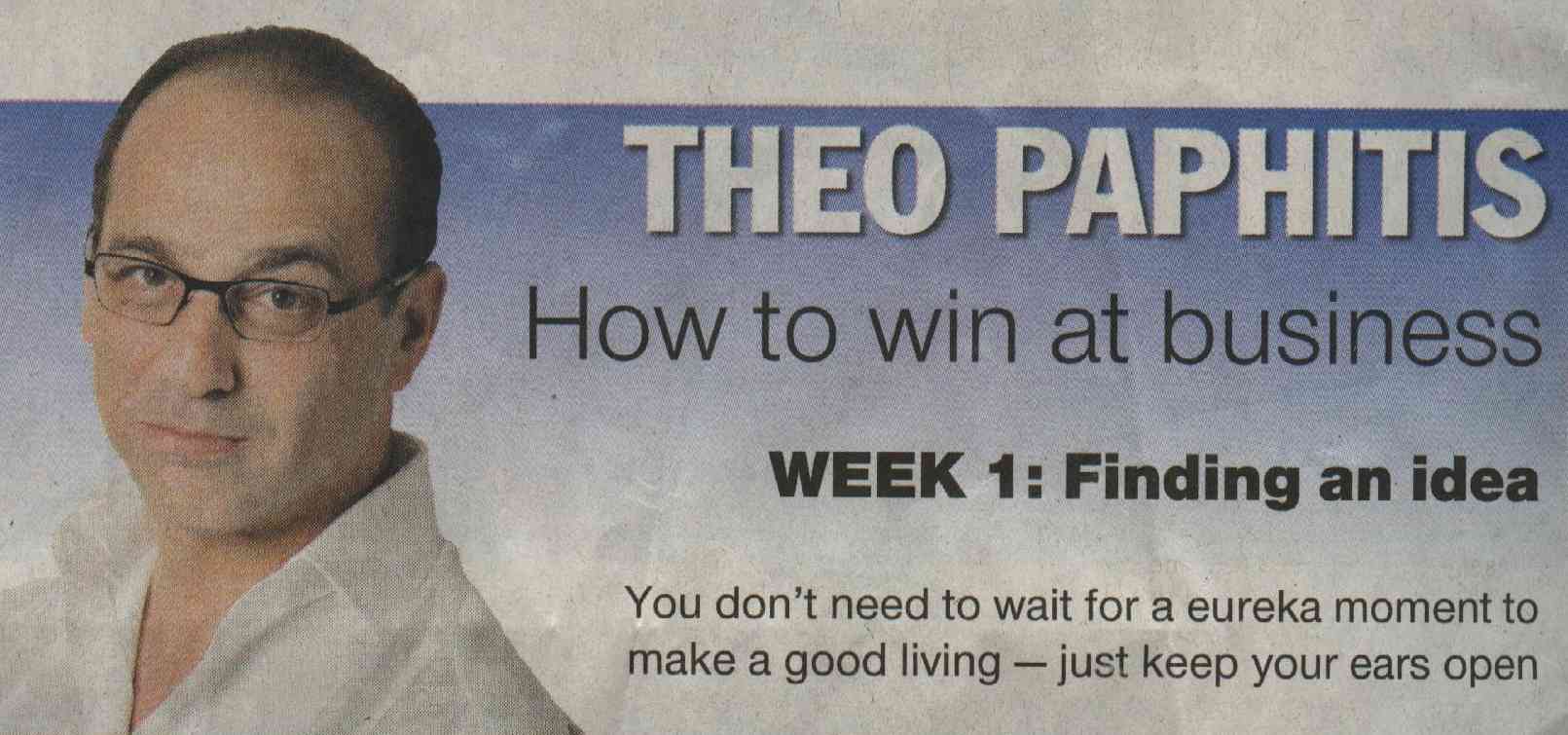|
|
|
Riding someone else`s brainwave "Just because
an idea is innovative or incorporates leading-edge (From the SUNDAY TIMES, March 4, 2007) |
|
THEO PAPHITIS was born in Cyprus and began his career at the age of 16 as a tea boy with Lloyd's of London insurance brokers. After gaining experience in retailing and finance he started up his own company at the age of 23 and since then has specialised in buying up and turning round ailing companies, including Ryman, the stationer, and the Contessa and La Senza lingerie chains. He continues to own Rymans, is a non-executive director of La Senza and is the joint owner of Red Letter Days. He is currently appearing on television as one of the Dragons in BBC2's Dragons' Den. In the first of a five-part series he suggests ways to get started in business. |
|
Well, not exactly pinched, that's the wrong word. I suppose you could say that I have modified them, worked on them a little, adapted them, that son of thing. I take these ideas with me and at the first opportunity consider them further. And if I still think it's a good idea in the cold light of day, I say to myself: "How can I capitalise on somebody else's thoughts and ideas?" Normally I start by scribbling words and diagrams on a piece of paper and seeing if I can translate that idea into a money-making scheme. But there's one thing to remember just because something is innovative or leading-edge technology does not mean it's going to make money. Many inventions that were thought to be technologically brilliant and ideas that seemed to have great merit never made their inventors a penny. Just like the road to hell is paved with good intentions, so the road to bankruptcy is paved with good ideas. Many of the good ideas that are put to us on Dragons' Den are so good that we don't invest in them. I am often collared in the street by people asking "why didn't you invest in such and such a project that was on the programme last week?" They tell me they thought it was a brilliant scheme. I have to explain that while the idea was good it could not be translated into a money-making venture. In business we are sometimes in danger of making ourselves into what I call "busy fools". That is to say we have taken a project, devoted time and resources to it, but the outcome is never going to be a financial success. But when I find an idea always someone else's that I think will work, I get off my backside and do something about it. That's the difference between me and so many other people. There is a tiny divide between a fantasist and a visionary. We all have dreams, and without dreams in business I don't believe that you can be successful. The trick is to turn those dreams into reality. The good news is that once you have made one idea come true, it gets easier the next time. That's why people turn up on Dragons' Den to get the help they need to make their first dream come true: Making £100m is easy. Making your first £lm is the difficult pan. First of all, you have got to be really passionate about your idea. If you can go to the pub and bore your friends senseless about your dream, then you are a good part of the way there. And while it is imperative that you have an idea you are passionate about and you want to bring it to fruition, you also have to be absolutely determined that you will make it work for you. It is highly unlikely that you will be successful in a business if you don't have the passion for it. One thing you must not do is fall into the trap of ignoring the facts and deficiencies in that idea. I wish I had a pound for every time I have heard people tell me they have done their market research and thai everyone loves their idea. Well, I'm telling you now, your idea is rubbish, so you can't say that everyone loves it any more. Because that's where a lot of people fall flat on their faces they lose sight of the bigger picture and ignore the failings of the idea. There is absolutely nothing wrong with aborting a project when your analysis and market research do not show that this is going to be the next big thing. That's when the old adage which stales that your first loss is your best loss kicks in. You take the hit and move on. I have seen people with ideas and ventures which they have persevered with for 10 or even 20 years and never brought to market. They still cannot accept the fact that their idea is simply not a viable business proposition and never will be. As an entrepreneur, the easiest person to fool is yourself. You have to be honest with the person who matters most you. Turning dreams into reality is something all entrepreneurs attempt to do with varying degrees of success. The key thing to remember is that if you don't attempt to do it, then it will never happen and will always remain a shaggy dog story you can only chat about with your friends in the pub. Don't let your idea be the one that got away. |
